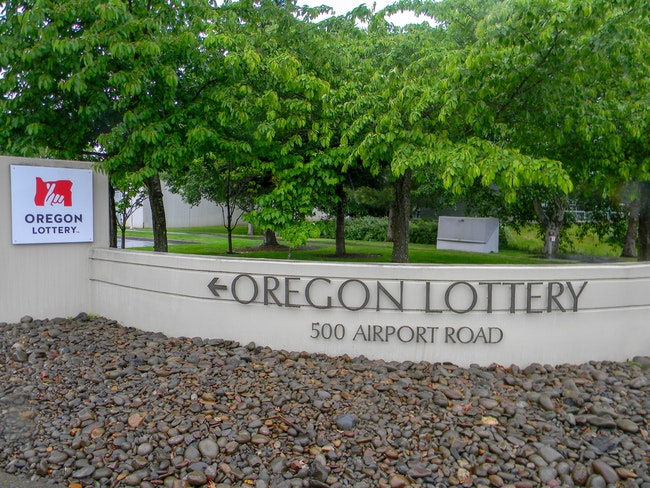
The headquarters of the Oregon Lottery in Salem. (Jake Thomas/Salem Reporter)
The Oregon Lottery is making plans to turn on video poker machines in those counties where retailers are allowed to reopen, said Matt Shelby, spokesman for the agency.
“We’ll be following the governor’s guidelines just like in restaurants so the experience for those playing will be different than it was a few months ago,” he said.
Machines will be spaced farther apart, players will have to stay at a required distance from each other, and after each person leaves a machine it will be sanitized.
Players will be required to check in to be assured that a machine has been cleaned. Players will not have to wear masks, Shelby said.
There are about 12,000 video poker machines statewide placed primarily in restaurants, bars and taverns. When they were turned off a few weeks ago, the $20 million a week in revenue generated by players dropped off overnight, according to Shelby.
The machines generated about 70 percent of the money collected by the agency.
The dramatic loss of funds forced the agency to close its Salem and Wilsonville offices to the public, implement layoffs, furloughs and salary cuts to help the lottery bridge the financial gap caused by COVID-19.
“The $7.4 million in reductions helped the lottery address two major issues – the immediate reduction in cash flow and a projected long-term contraction of the retail market,” said Barry Pack, director of the Oregon Lottery.
Every lottery employee was affected by the moves in some way:
• Permanent layoffs for 60 people or 13% of the workforce.
• Furloughs of 30 days or longer affecting 290 positions or 61% of the work force.
• Three-month salary reductions for three months of 15% for executives and 10% for remaining staff.
When paired with the roughly $20 million in one-time savings and deferred costs announced in April, the latest reductions allow the lottery to “maintain its financial footing,” Pack said.
Before these measures were taken, the lottery employed about 450 people, many of them working out of vans around the state servicing the poker machines.
Although video poker machines were shut off, the lottery still sold Scratch-It tickets. In a normal year, the agency made about $130 million selling them. Ticket sales since the shutdown have ticked up a bit, Shelby said.
About 91% of the money raised by lottery games goes to pay off prizes. Another 5.6% is transferred to the state, 2% to retailers and 1% covers operating costs.
Contact Salem Reporter: [email protected].




